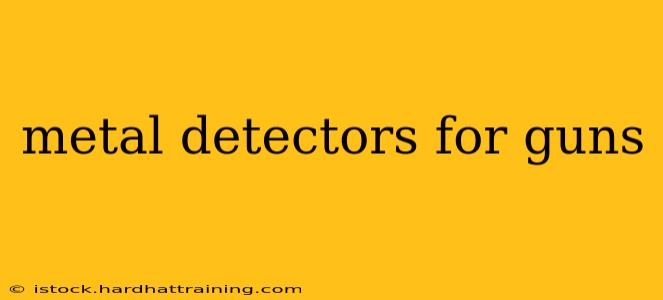Finding a reliable metal detector for firearms can be tricky. This isn't about finding tiny metal fragments; we're talking about detecting the substantial metal components of handguns, rifles, and other weaponry. The requirements are significantly different than those for detecting smaller metallic objects like jewelry or coins. This guide will explore the key considerations when choosing a metal detector specifically suited for this purpose.
Understanding the Unique Challenges of Detecting Firearms
Detecting firearms with a metal detector presents unique challenges compared to other applications. The size, shape, and composition of firearms vary considerably, influencing the effectiveness of different detection methods. Furthermore, the environment where the detection takes place—whether it's a security checkpoint, a construction site, or a concealed carry situation—can significantly impact the results.
Factors Influencing Detection Effectiveness:
- Metal Composition: Firearms are primarily made of ferrous metals (iron and steel alloys), but some components may incorporate non-ferrous metals like aluminum or brass. The detector's sensitivity to different metal types is crucial.
- Size and Shape: The size and shape of a firearm drastically affect its detectability. A large rifle will be easier to detect than a small handgun, particularly if it's concealed.
- Environmental Interference: Ground mineralization, electromagnetic interference (EMI), and other environmental factors can create false signals or mask the presence of a firearm.
- Concealment Methods: The effectiveness of detection is reduced when firearms are concealed within bags, clothing, or other objects.
Types of Metal Detectors Suitable for Firearms Detection
Several types of metal detectors are used for detecting firearms, each with its strengths and weaknesses. Choosing the right type depends on the specific application and desired level of sensitivity.
1. Walk-Through Metal Detectors:
These are commonly found in airports and other high-security areas. They're effective at detecting large metallic objects like firearms but are less sensitive to smaller weapons or those concealed within layers of clothing.
2. Handheld Metal Detectors:
Handheld metal detectors offer greater precision and maneuverability. They are ideal for scanning individuals or luggage more thoroughly, allowing for closer examination of suspicious areas. However, they require more operator skill and time.
3. Ground Scanners:
While not directly used for scanning individuals, ground scanners are essential for locating buried or hidden weapons. These are powerful devices used in forensic investigations or security sweeps of large areas.
Key Features to Look for in a Metal Detector for Firearms:
- High Sensitivity: The detector needs to be highly sensitive to ferrous metals to detect even partially concealed firearms reliably.
- Discrimination Capabilities: The ability to differentiate between different types of metals is crucial to minimize false alarms.
- Adjustable Sensitivity: This allows you to fine-tune the detector's sensitivity based on the environment and the potential for interference.
- All-Metal Mode: While discrimination is useful, all-metal mode ensures that no metallic object is missed, crucial for security applications.
- Audio and Visual Indicators: Clear audio and visual signals are essential for quick and efficient detection.
- Durability and Portability: Depending on the application, durability and portability are important factors to consider.
Beyond the Technology: Training and Proper Procedures
The effectiveness of any metal detector depends heavily on the operator's skill and the procedures followed. Proper training is paramount for accurate and consistent results. Understanding false positives and negatives, effective search techniques, and response protocols are critical components of successful firearms detection.
Conclusion
Selecting a metal detector for firearms requires careful consideration of various factors, including the specific application, environment, and desired level of sensitivity. Investing in a high-quality detector with the appropriate features and undergoing proper training are essential for ensuring effective and reliable firearms detection. Remember, safety and security are paramount, and choosing the right tool and training your personnel correctly are critical aspects of any security protocol.
